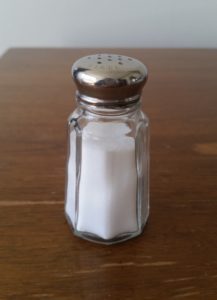 Iodine is an essential mineral for health, especially during pregnancy, because it is needed for intellectual development and thyroid functioning. For years people bought iodized table salt at the grocery store in order to make sure that they have enough iodine in the diet. However, the use of other salts (e.g. Himalayan salt) that don't have added iodine, and following a vegan or vegetarian diet can increase the risk of iodine deficiency.
Iodine is an essential mineral for health, especially during pregnancy, because it is needed for intellectual development and thyroid functioning. For years people bought iodized table salt at the grocery store in order to make sure that they have enough iodine in the diet. However, the use of other salts (e.g. Himalayan salt) that don't have added iodine, and following a vegan or vegetarian diet can increase the risk of iodine deficiency.
A small study by Australian researchers looked at iodine levels in 2 groups of pregnant women, who were either vegan/plant-based diet participants or omnivores (eating both meat and plants). Both groups had urine with iodine levels below the World Health Organization recommended 100 µg per liter, but the vegan/plant-based group was far lower at 44 µg per liter. Those eating Himalayan salt had severely deficient levels: 23 µg per liter. The study did not look at the intellectual functioning of the infants after they were born.
How to get enough iodine in the diet? Foods containing iodine are seafood, seaweed, bread fortified with iodine, iodized salt, eggs, and dairy foods. Also, iodine supplements. Research indicates that adequate iodine intake before conception is necessary to ensure optimal maternal thyroid function during pregnancy, which is required for fetal intellectual development.
Medical Xpress: Poor iodine levels in pregnancy poses risks to fetal intellectual development
A growing number of young Australian women are at increased risk of having children born with impaired neurological conditions, due to poor iodine intake.
Dietary changes, including a growing trend towards the avoidance of bread and iodised salt, as well as a reduced intake of animal products containing iodine can contribute to low iodine levels.
A small pilot study undertaken by the University of South Australia (UniSA) comparing iodine levels between 31 vegan/plant-based participants and 26 omnivores has flagged the potential health risk.
Urine samples showed iodine readings of 44 ug/L in the plant-based group, compared to the meat eaters' 64 ug/L level. Neither group came close to the World Health Organization's recommended 100 grams per liter.
Participants from both groups who chose pink or Himalayan salt instead of iodised salt had severely deficient iodine levels, averaging 23 ug/L.
While the study was undertaken in South Australia, it builds evidence on a 2017 US study (1) that found nearly two billion people worldwide were iodine deficient, resulting in 50 million experiencing clinical side effects.
UniSA research dietitian Jane Whitbread says adequate iodine is essential for fetal intellectual development. "Mild to moderate iodine deficiency has been shown to affect language development, memory and mental processing speeds," Ms Whitbread says.
"During pregnancy, the need for iodine is increased and a 150 mcg supplement is recommended prior to conception and throughout pregnancy. Unfortunately, most women do not take iodine supplements before conceiving. It is important to consume adequate iodine, especially during the reproductive years."
Dietary sources of iodine include fortified bread, iodized salt, seafoods including seaweeds, eggs, and dairy foods.
The growing preference of Himalayan salt over iodized table salt may also be problematic, Ms Whitbread says. A quarter of women in the study reported using the pink salt which contains an insignificant level of iodine.
Another issue is that plant-based milks have low levels of iodine and are not currently fortified with this nutrient.
